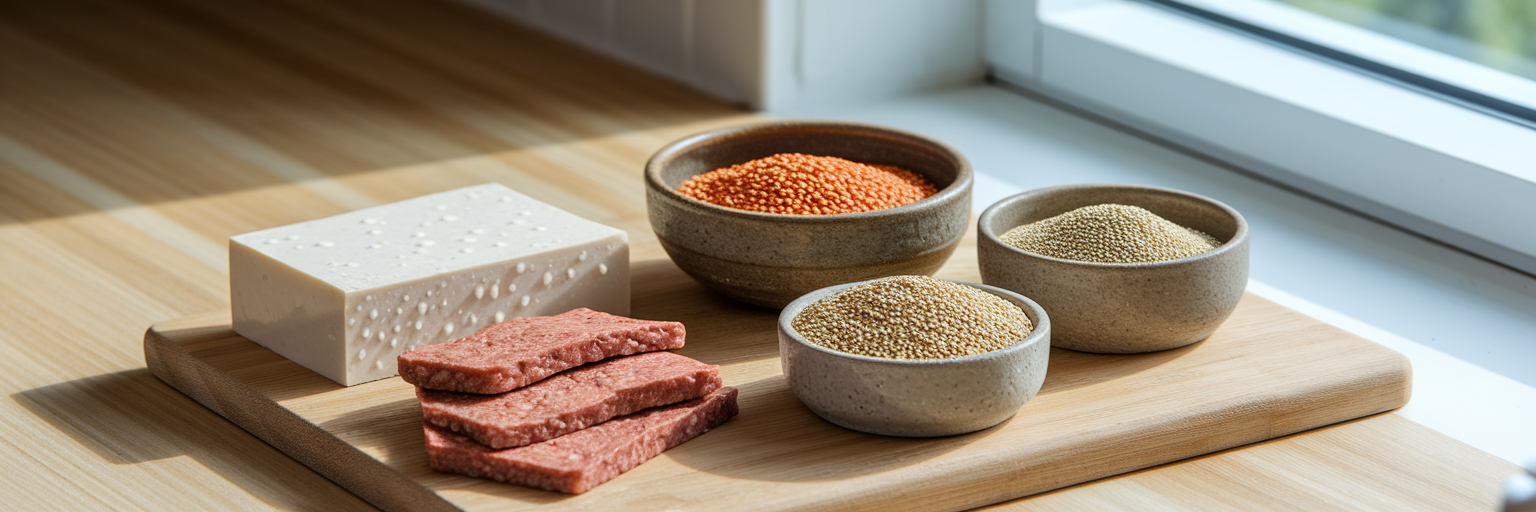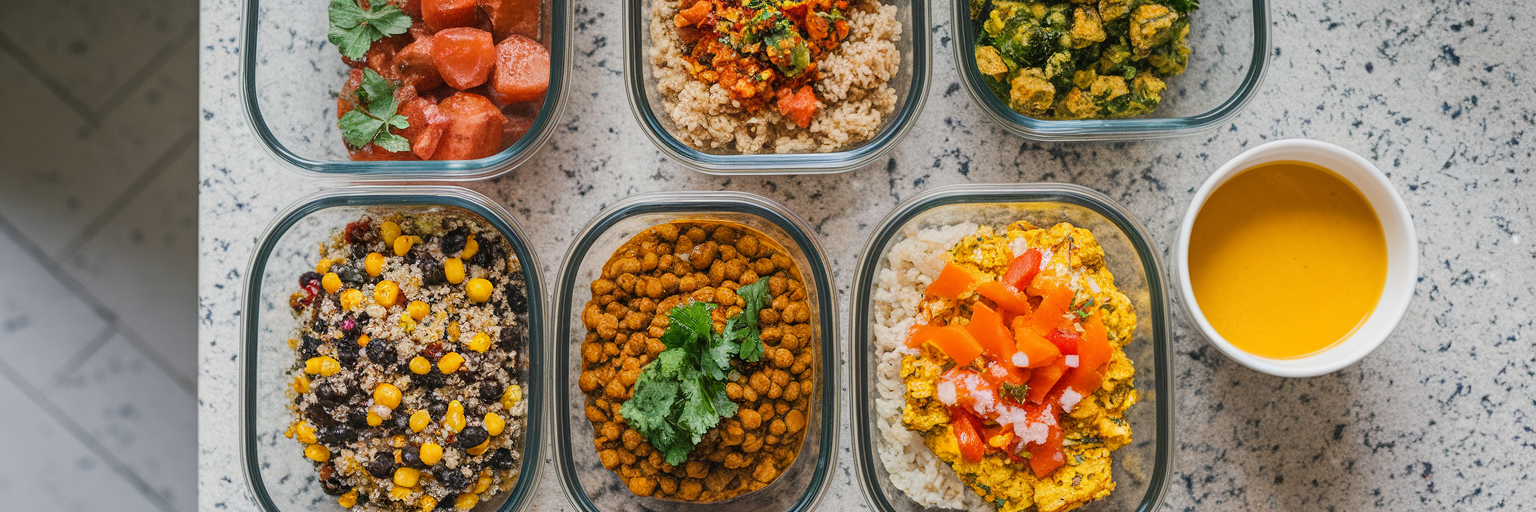Why Your Macronutrient Mix Matters for Fitness
You put in the hard work at the gym, pushing through that last rep and showing up consistently. But we all know that what happens in the kitchen is just as important for seeing results. When it comes to building muscle, it’s all about mastering your macronutrients. Think of them as your body’s construction crew: protein is the repair team that rebuilds muscle fibers, carbohydrates are the high-octane fuel that powers your workouts, and healthy fats are the essential support system for hormone balance and overall health.
For anyone on a plant-based journey, the big question is often how to get this mix right. The challenge isn't just about eating vegan; it's about eating strategically to support your fitness goals. There’s an outdated myth that a plant based diet for athletes is somehow less effective for building muscle, but that idea is long past its expiration date. Modern nutritional science has shown us that a well-planned vegan diet is more than capable of supporting serious muscle growth. In fact, a recent study highlighted by ScienceDaily shows that when protein intake is sufficient, there's no significant difference in muscle growth between vegan and omnivorous diets. It’s all about knowing how to balance your plate.
Mastering Plant-Based Protein for Muscle Repair

Let's clear up a common point of confusion: the "complete protein." You don't need to stress about combining specific foods in every single meal to get all your essential amino acids. Your body is smart enough to pool amino acids from the various foods you eat throughout the day. By including a variety of complete protein vegan sources in your diet, you’ll easily cover all your bases. The key is diversity.
To find the best vegan protein for muscle growth, focus on incorporating a mix of these powerhouses into your daily routine:
- Tofu: Incredibly versatile and a blank canvas for flavor, it’s perfect for scrambles, stir-fries, and more.
- Tempeh: This fermented soy product has a firm, nutty texture that’s amazing when grilled or baked.
- Lentils: A budget-friendly staple that’s packed with protein and fiber, great for soups and curries.
- Chickpeas: The foundation for hummus, but also fantastic roasted for a crunchy snack or added to salads.
- Quinoa: A true superfood that contains all nine essential amino acids in one package.
- Seitan: Made from wheat gluten, it has a uniquely meaty texture that satisfies cravings.
Putting these sources into action is easier than you think. For some delicious inspiration, check out these 3 easy vegan protein recipes you'll actually crave that we put together.
As for how much protein you need, a good starting point is between 0.7 to 1.0 grams per pound of body weight. Listen to your body and adjust based on your activity level and how you feel. To maximize muscle repair, try "protein pacing"—spreading your intake evenly across your meals. This keeps a steady supply of amino acids available for your muscles all day long.
| Protein Source | Protein per 1-Cup Serving (Cooked) | Key Benefit |
|---|---|---|
| Lentils | ~18 grams | Excellent source of fiber and iron |
| Chickpeas | ~15 grams | Versatile for salads, curries, and snacks |
| Tofu (Firm) | ~22 grams per ½ cup | Absorbs marinades well; great meat substitute |
| Tempeh | ~34 grams | Fermented, easy to digest, and has a nutty flavor |
| Quinoa | ~8 grams | A complete protein containing all nine essential amino acids |
| Edamame (Shelled) | ~22 grams | Great as a snack or addition to meals |
Note: Protein content can vary slightly by brand and preparation method. This table provides a quick reference to help you diversify your protein intake throughout the day.
Fueling Your Workouts with Smart Carbs and Fats
While protein handles repairs, carbohydrates are your primary energy source. Getting your carbs right is crucial for powering through tough workouts and replenishing your energy stores afterward. It’s helpful to think of them in two categories:
- Quick-Energy Carbs: Simple carbohydrates like a banana or a handful of dates are perfect for a pre-workout boost because they digest quickly and give you immediate fuel.
- Sustained-Fuel Carbs: Complex carbohydrates like oats, sweet potatoes, and brown rice release energy slowly, making them ideal for keeping you fueled for longer periods.
One of the great efficiencies of a plant-based diet is that many foods offer a two-for-one deal. Foods like beans, lentils, and chickpeas provide both high-quality protein and complex carbs, simplifying your meal planning.
And let’s not forget healthy fats. Their role goes far beyond just calories. Fats are vital for producing hormones, including those involved in muscle growth, and they help reduce inflammation, which is key for recovery. Make sure you’re including these sources in your diet:
- Avocados
- Walnuts and almonds
- Chia and flax seeds
- Olive oil
A simple way to visualize how to balance vegan macros is the balanced plate model: aim to fill half your plate with complex carbs, a quarter with plant-based protein, and a quarter with colorful vegetables, topped with a source of healthy fats. Building a balanced plate is a cornerstone of a healthy lifestyle, and for more tips on nutrition and wellness, you can explore our blog.
Practical Vegan Meal Planning for a Week of Fitness

Knowing what to eat is one thing; putting it into practice day after day is another. A solid high protein vegan meal plan doesn't have to be complicated. It’s about having a simple, repeatable system.
Sample High-Protein Vegan Meal Ideas
Here are a few ideas to get you started:
- Breakfast: A hearty tofu scramble packed with spinach and bell peppers, served with a side of avocado toast on whole-grain bread.
- Lunch: A big salad with mixed greens, a cup of chickpeas, quinoa, chopped veggies, and a tahini dressing.
- Dinner: Lentil and vegetable curry served with brown rice, or baked tempeh with roasted sweet potatoes and broccoli.
Smart Snacking Strategies
Keep your energy levels stable and your muscles fed between meals with these easy snacks:
- An apple with a tablespoon of peanut or almond butter
- A handful of roasted chickpeas
- Edamame, steamed and lightly salted
- A small protein shake
The Power of Meal Prep
The secret to consistency is preparation. Dedicate a few hours on a Sunday to prep staples for the week. Cook a large batch of quinoa or brown rice, roast a tray of vegetables, and wash and chop your greens. Having these components ready to go makes assembling healthy meals during a busy week feel effortless. And you don't have to take our word for it. Dietitians at publications like EatingWell have created plans showing it's entirely possible to get over 70 grams of protein daily on a vegan diet. Plus, building your meals around staples like beans, lentils, and oats makes this a very affordable and sustainable way to eat.
Using Vegan Protein Powders to Supplement Your Diet
Let's be realistic: life gets busy. While whole foods should always be your foundation, vegan protein powders are an incredibly convenient tool to help you hit your goals. They are perfect for a quick post-workout recovery shake, for boosting the protein content of your breakfast smoothie on a hectic morning, or simply for ensuring you meet your daily protein target without having to cook another full meal.
Most protein powders in the US are made from pea, soy, brown rice, or hemp, and modern blends are carefully formulated to provide a complete amino acid profile and a smooth, delicious taste. But don't just limit them to shakes! You can get creative by adding a scoop to:
- Your morning oatmeal or overnight oats
- Pancake or waffle batter
- Homemade energy balls or protein bars
- Vegan yogurt for an extra protein punch
Think of protein powder as a reliable assistant in your nutritional toolkit. If you're looking for a high-quality, delicious option to help you hit your goals, our Chocolate Vegan Protein is a fantastic place to start. Have a favorite way to use protein powder? Share your tips in the comments below!
Your Blueprint for Long-Term Vegan Fitness Success
Building a strong, healthy body on a plant-based diet is entirely achievable with the right approach. It all comes down to a few core principles. Here’s your blueprint for success:
- Prioritize whole foods as the foundation of your diet.
- Combine different protein sources throughout the day to cover your bases.
- Fuel your body with smart carbs and healthy fats.
- Supplement intelligently with a quality protein powder when it’s convenient.
Remember, consistency will always be more important than perfection. You now have the knowledge to build a nutritional plan that works for you. As you continue on your fitness journey, feel free to explore our full range of products designed to support your goals. If this guide was helpful, pass it on to a friend on a similar plant-based fitness journey!



